 “Keep an open mind, but not so open that your brains fall out” is a popular skeptic maxim because it summarizes key elements of skepticism in a pithy, humorous way. But who is the original source for this advice? Some attribute it to Carl Sagan, whose birthday is being celebrated this week as Carl Sagan Day in several locations. It turns out the phrase may in fact have a birthday this week—but that birthday has nothing to do with Sagan!
“Keep an open mind, but not so open that your brains fall out” is a popular skeptic maxim because it summarizes key elements of skepticism in a pithy, humorous way. But who is the original source for this advice? Some attribute it to Carl Sagan, whose birthday is being celebrated this week as Carl Sagan Day in several locations. It turns out the phrase may in fact have a birthday this week—but that birthday has nothing to do with Sagan!
Tidbits from history like this are one of my skeptical interests. I indulge this interest by collecting dates for such things and posting them daily on social media. (You can find where to read them at the Skeptic History page on my blog). I’ve collected these dates over several years from all sorts of sources. As I find them, I add each one to my file for the next time that date rolls around.
Sometimes you can find anniversary dates for surprising things. For instance, did you know that the word “bunkum” (original root of the term “debunk”) is actually derived from a specific incident in the U.S. Congress?
On February 25, 1820 Congressman Felix Walker of North Carolina stood to make a speech “for Buncombe” (his home district). He chose an inopportune moment, because a heated debate over the Missouri Compromise was taking place, and his colleagues were not in the mood. Knowing that Walker’s speeches were long-winded and nonsensical, they shouted him down. When his speech was printed later, sure enough it made little sense to anyone but Walker. Speaking “for Buncombe” (or “bunkum”) soon became a euphemism for talking nonsense.1
Curiosity About “Brains Fall Out”
About three years ago I took interest in a 2007 (former) JREF Forum thread in which skeptics were discussing the origin of the “brains fall out” quote. Many skeptics attribute it to Carl Sagan because he included it in his 1996 book The Demon Haunted World. But in the book, Sagan credits the saying to skeptic James Oberg.2
Keeping an open mind is a virtue—but, as the space engineer James Oberg once said, not so open that your brains fall out.
Just a few minutes work with Google will find a large number of other alleged sources. But who is the original?
I wasn’t the first to go down this rabbit hole, as it turns out. James Hrynyshyn wrote a short piece in the March 2003 Skeptic magazine on this very topic. He contacted Oberg, who also disclaimed having originated it, but couldn’t recall where he had first heard it. “All he knows for certain is that he began to use his version in the mid 1970s, when he was working with CSICOP debunking UFO claims.” Hrynyshyn found other suspects for the original source including physicist Richard Feynmann, author Stephen A. Kallis, philosopher Bertrand Russell and former New York Times publisher Arthur Hays Sulzberger.3
Another skeptic who researched this is Swedish author Peter Olausson. He runs a website called Faktoider which has hosted a page discussing the quote since at least 2009. He lists more possible candidates including Richard Dawkins, J. Robert Oppenheimer, Virginia Gildersleeve and Harold T. Stone. And he found a closely related quote that we’ll examine later.4
I had been digging into this mystery on my own since finding that forum thread, and I had found a few candidates that Hrynyshyn and Olausson hadn’t. But last April a blog post by Garson O’Toole, known online as The Quote Investigator, traced the origin past where I had gone. He found several older quotes that may have led to this one. And he found a new candidate I had never identified, and in fact I had never heard of.5 But rather than just give away the answer from that post, let’s explore and see what we can learn about some techniques for researching something like this.
I’ll trace backward from Sagan through some of the top suspects. I won’t track down every single reference here. Some are clearly post-Sagan and thus add nothing to our understanding of the source. For instance, according to Wikiquote, Richard Dawkins first used it in an November 1996 lecture, which is post-Sagan.
Some are easily dispatched. Harry T. Stone is a fictional character—he was the judge on the US sitcom “Night Court”. He was played by actor Harry Anderson, who is also a magician. The line was supposedly drawn from Anderson’s magic act which began in the late 1960s. Because magicians and skeptics run in overlapping circles, it is not hard to imagine where he got it.
But let’s look further back. Maybe we can learn a little about the quote as we trace it back through some major personalities.
Researching the Quote Online
A relatively recent technology change has made research like this much easier. Two years after Hrynyshyn’s investigation, Google created Google Books—an effort to digitize and index on the web as many books as possible. This resource is invaluable for historical research, because it allows full-text searches for quotes and offhand references that never would have made their way into traditional library indices.
And unlike most of the rest of the web, Google Books sometimes becomes more useful the further you go back in time. This is because older sources are more likely to be out of copyright, allowing Google to post the entire text online for free examination. Using this tool (and others) let us dig in to some of these possible candidates and see what we can find.
One interesting outgrowth of Google Books is a companion tool called the Ngram Viewer. It allows you to research the popularity of words or phrases in books over time. By searching for bunkum and debunk using this tool, we can confirm that bunkum originated sometime in the 1830s and debunk emerged around 1920.
(Click on the graph to see the live data at Google). That’s a nice confirmation of what we know.
However, I must caveat this graph by observing that professional librarians have noticed problems with the metadata stored for books by Google. A search for the word “internet” used in books between 1800 and 1950 is illustrative. One might expect it to return nothing at all, but it returns hundreds of obviously anomalous results. So let us proceed with some caution.
As it turns out, the full skeptic quote is too long to search using this tool—and frankly, everyone words it a bit differently. Some sources say “brains fall out” and some say “brain falls out” and so on. The tool finds nothing using those two phrases. But if we search the phrase “open mind” as well we can generate this interesting graph.
(Again, click on the graph to view the data at Google). As you can see, this would indicate the full phrase could have originated no earlier than the late 19th century, as “open mind” was not in common use before then. So our quote is likely to be a 20th century invention. Therefore we can quickly dispense with sources that claim it is much older than that—at least in English.
Let’s get back to our candidates.
Arthur Hays Sulzberger
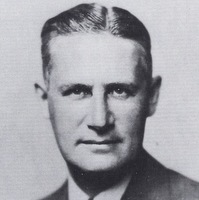
via Library of Congress
Arthur Hays Sulzberger (1891–1968) was the publisher of the New York Times from 1935 to 1961. Many cite Sulzberger as the source because of a speech titled “Man’s right to knowledge and the free use thereof” given in November 1954 at the Columbia University bicentennial celebration. Remember Columbia and New York City, they will reappear later.
Now I do not believe in softness of any kind in fighting tyranny, subversion, or infiltration. Fortunately there is a long public record to this effect on the editorial pages of the New York Times. Although I favor the open mind, I certainly do not advocate that the mind should be so open that the brains fall out.
Having found that quote in Google Books, I did additional searches limited to years prior to the Sulzberger speech. There are three pages of references, pretty convincingly proving that Sulzberger is not the original source, which we will confirm in a bit. Many of them seem related to academia. Maybe that’s where we should be looking.
Virginia Gildersleeve
Virginia Crocheron Gildersleeve (1877–1965) began teaching at Barnard in 1908 and served as Dean of the school for 36 years, from 1911 to 1947. Barnard is one of the schools colloquially called “The Seven Sisters”—a group of historically women’s colleges in the U.S. Barnard is also adjacent to Columbia University in New York and the two are affiliated legally.
Gildersleeve was my top candidate for some time, after I discovered her name on Peter Olausson’s site. On a website dedicated to a public television program called “The Open Mind,” I found an episode transcript where the host mentions her.
In my student days at Columbia College … those dim, dark days almost beyond recall … it was reported that across the street at Barnard, Dean Virginia Gildersleeve was warning her students: “Young ladies, have an open mind, but not so open that your brains fall out” … a caveat that today many thoughtful persons believe students, faculty and Americans generally have ignored.
Richard Heffner attended Columbia in the 1940s, near the end of her tenure at Barnard. But I was unable to find an exact citation for Gildersleeve having said this. So I reached out to Gildersleeve biographer Rosalind Rosenberg.
Via email she told me, “It’s a nice quote, and Gildersleeve might have said it, but I have never run across the quotation in any of her papers. Of course, she might well have said it to the students without ever having committed it to paper.”
It doesn’t mention Gildersleeve, but a newspaper column O’Toole discovered in a January 1944 issue of the Cleveland Plain Dealer refers to an unnamed professor at Barnard using the saying.6 The multiple references to Barnard and the connection to New York and Columbia are tantalizing, but I must admit we can’t quite nail this one down. There may be answers in Gildersleeve’s papers at the Columbia library, her biographer’s comment notwithstanding.
William Allan Neilson
William Allan Neilson (1869–1946) was President of Smith College from 1917 to 1939, who also taught at Bryn Mawr and Columbia earlier in his career. (Both Smith and Bryn Mawr are members of the Seven Sisters). Digging through those pre-Sulzberger academic references I mentioned above, one finds several sources which mention Neilson specifically in reference to this quote. O’Toole found a similar reference in the New York Times archive where Sulzberger credited Neilson.7
I believe with the late President Neilson of Smith that it’s wise to “keep an open mind, but not so open that your brains fall out.”
So now we know Sagan, Oberg and Sulzberger have all disclaimed being the original source of the quote. But when had Neilson said it?
Trying to run this reference down led me to a 1940 volume of the Smith Alumnae Quarterly that shows up in Google Books, but only with short “snippets” available. It was enough to see it was the right quote and Neilson was mentioned nearby, but not to get the context. (And as with Gildersleeve, there may be an opportunity for an enterprising skeptic to dig further in Neilson’s papers at Smith).
I had filed away the Smith Alumnae reference with a note to myself to try to get a copy of those pages to find out the details. But O’Toole was not as easily dissuaded—he found it. And that leads us to a final possible originator.
Walter Kotschnig
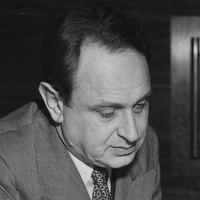
University of Chicago Photographic Archive, apf1-00574, Special Collections Research Center, University of Chicago Library.
Walter Maria Kotschnig (1901–1985) was an Austrian-American educator and diplomat, who held a professorship at Smith College (alongside Neilson) and nearby Mount Holyoke (another of the Seven Sisters) from 1937 to 1944. He was involved in the World Student Service and later became a diplomat with the United Nations. He’s a somewhat obscure figure, not even rating a Wikipedia article at this time (though I may remedy that).
O’Toole identified Kotschnig as a possible source based on a very short January 1940 newspaper item that reported he said this in a talk to Holyoke students.8 But he also found the Smith Alumnae article I did, and contacted Smith College to get a copy. He discovered it is a report concerning an Armistice Day speech by Kotschnig at Smith. William Allan Neilson is mentioned, but not as the source of the quote.9
Let us keep our minds open, by all means, as long as that means keeping our sense of perspective and seeking an understanding of the forces which mould the world. But don’t keep your minds so open that your brains fall out! There are still things in this world which are true and things which are false; acts which are right and acts which are wrong, even if there are statesmen who hide their designs under the cloak of high-sounding phrases.
He doesn’t actually say “open mind” but all the other elements of the quote are present. I was able to find in the online catalog of Kotschnig’s papers that this was a speech titled “Do we want peace?” given on Wednesday, November 8, 1939 at Smith. I also obtained a scan of the speech from the library, where I found this:

Walter Maria Kotschnig Papers, M.E. Grenander Department of Special Collections & Archives, University at Albany , SUNY.
As you can see, Kotschnig may have intended to disclaim being the source of the quote, but crossed it out before delivering the speech. His handwriting is unclear to me, perhaps it says “And as a Chinese friend said” or “And as a Chinese phil. said”? Perhaps he thought it was an old proverb. But this remains the earliest documented version of the quote.
To be complete, we have one more person to mention.
Max Radin
Max Radin (1880–1950) was a law professor at the University of California from 1919 to 1948. He was educated in New York City, including a Ph.D. from Columbia. There is a quote from Radin in an article in the Yale Law Journal that Olausson turned up, dating from 1937.10
[Practical gentlemen] have a number of bitterly sarcastical comments on persons whose minds are so open that their brains fall out.
As O’Toole points out, this quote does not have the spirit of an adage or rule of thumb, but is “used rhetorically in harsh criticism.” Thus while it uses some key phrases, it doesn’t seem to be the true ancestor of the quote we are after.
Some Conclusions
But the Radin quote leads us to another conclusion. Note the academic and geographic connections I’ve pointed out between all of these possible sources. Many of them have some connection to Columbia University and its location, New York City. The others have connections to various of the Seven Sisters, especially Barnard (near Columbia) and Smith College which is just 168 miles away in Massachusetts.
There are yet more connections among the candidates I didn’t examine in detail. J. Robert Oppenheimer was born in New York City in 1904 and did his undergrad work at Harvard in Massachusetts. Richard Feynman was also born in New York City in 1918 and was educated at the Massachusetts Institute of Technology and Princeton. Stephen A. Kallis Jr. was born in 1937 and attended Columbia University. Oberg was born in New York City in 1944 (but educated in Ohio, Illinois and New Mexico). O’Toole also mentions poet Marianne Moore—she was born in 1872 and attended Bryn Mawr. The only commonly proposed source of this quote who has no connections at all is Bertrand Russell, but I’ve also seen no good evidence he actually used the saying.
Whether or not we’ve reached the end of this road, I think we have found the neighborhood where it leads. Clearly the connection between “open mind” and “brains fall out” was a Dawkinsian meme that was bouncing around academia, particularly in the northeastern United States, in the 1930s.
And there you have it. For now, based on O’Toole’s excellent research (with some tidbits of my own), the best estimate is that this Saturday, November 8, 2014 is the 75th anniversary of Walter M. Kotschnig’s earliest known usage of this skeptical maxim.
But as in science, historical research like this is provisional, so the search may go on.
Many thanks to James Hrynyshyn, Peter Olausson, and Garson O’Toole who did the bulk of the research, and Rosalind Rosenberg of Barnard and Brian Keough of University of Albany, SUNY who helped me directly. Thanks also to @the_crazy_dwarf on Twitter who found several of the photos for this post.
References
- Safire, William. Safire’s Political Dictionary. Oxford: Oxford University Press, 2008. p. 89
- Sagan, Carl, and Ann Druyan. The Demon-Haunted World: Science As a Candle in the Dark. New York: Random House, 1996. p. 187
- Hrynyshyn, James. “When Brains Fall Out: The Origin Of A Skeptical Maxim”. Skeptic magazine. 10(1), March 2003, pp. 34–35
- Olausson, Peter. “faktoids: Keep an open mind—but not so open that your brain falls out” faktoider. 2009. Web. (Accessed October 25, 2014) http://www.faktoider.nu/openmind_eng.html
- O’Toole, Garson. “Do Not Be So Open-Minded That Your Brains Fall Out” Quote Investigator. April 13, 2014. Web. (Accessed October 25, 2014) http://quoteinvestigator.com/2014/04/13/open-mind/
- Clarage, Eleanor. “Main Street Meditations” Cleveland Plain Dealer January 24, 1944. p. 7.
- Sulzberger, Arthur Hays. “Have We the Courage to Be Free?” The New York Times Feburary 15, 1953 p. SM12
- “Professor Tells Students to Open Minds to Truth” Blytheville Courier News January 27, 1940. p. 2
- “Chapel and Assembly Notes” Smith Alumnae Quarterly, Vol. 31, No. 2 (February 1940), p. 153
- Radin, Max. “On Legal Scholarship” The Yale Law Journal Vol. 46, No. 7 (May, 1937), pp. 1124–1141


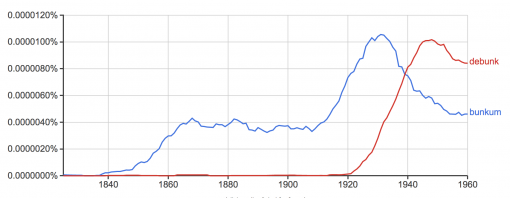
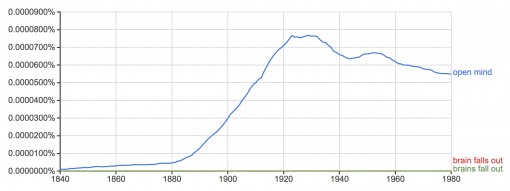
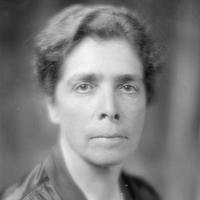
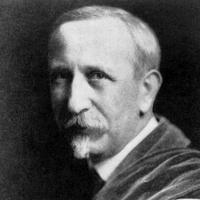
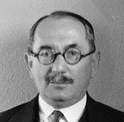











I’ve long had a poster attributing the quote to Bertrand Russell, without a cite to verify the source, regretfully.
Incidentally, I found a closely related quote that can be accurately sourced to Victorian-era novelist Samuel Butler:
Butler, Samuel, and Henry F. Jones. The Notebooks of Samuel Butler. New York: E.P. Dutton, 1917. Print.
Interesting topic and thanks for the hints on research.
Strangely enough, in my evangelical days (1970s) I often heard this phrase from the pulpit!
It was used to caution the Christian faithful from being too curious about “secular humanism” – which was the Big Scary Threat to religious belief in those days. It was also sometimes evoked as a guard against getting too much education.
The maxim sounds awkward, confusing the skull with the mind, as if the mind keeps the brain from falling out.
It doesn’t seem like such a stretch to imagine that once the concept of ‘open mind’ originated,that many people could independently make the ‘brains fall out’ connection,since ‘open mind’ is often used as an excuse for credulity.
I personally came up with “Keep an open mind,but not so open that anyone can dump their garbage into it.” It is possible that I was influenced by the more famous version,but I can’t say for sure,and I probably am not the only one to have come up with that version of it either.
It’s really hard to be original…even if something is truly original to you.
I like your version better because it runs with the analogy for filtering ideas. The popular version switches from the analogy to a different metaphor of the brain falling out, which suggests that it’s best to just keep your mind closed.
If I had a nickel for every idea that was truly original to me…